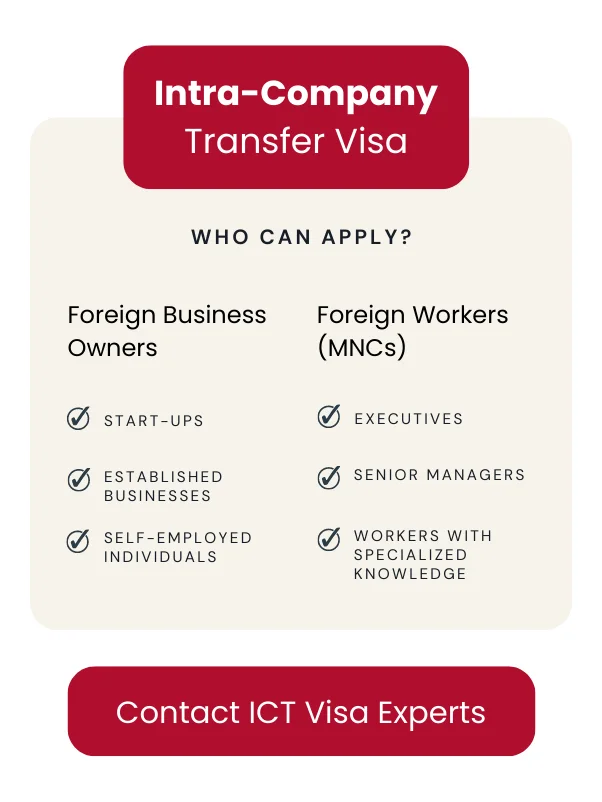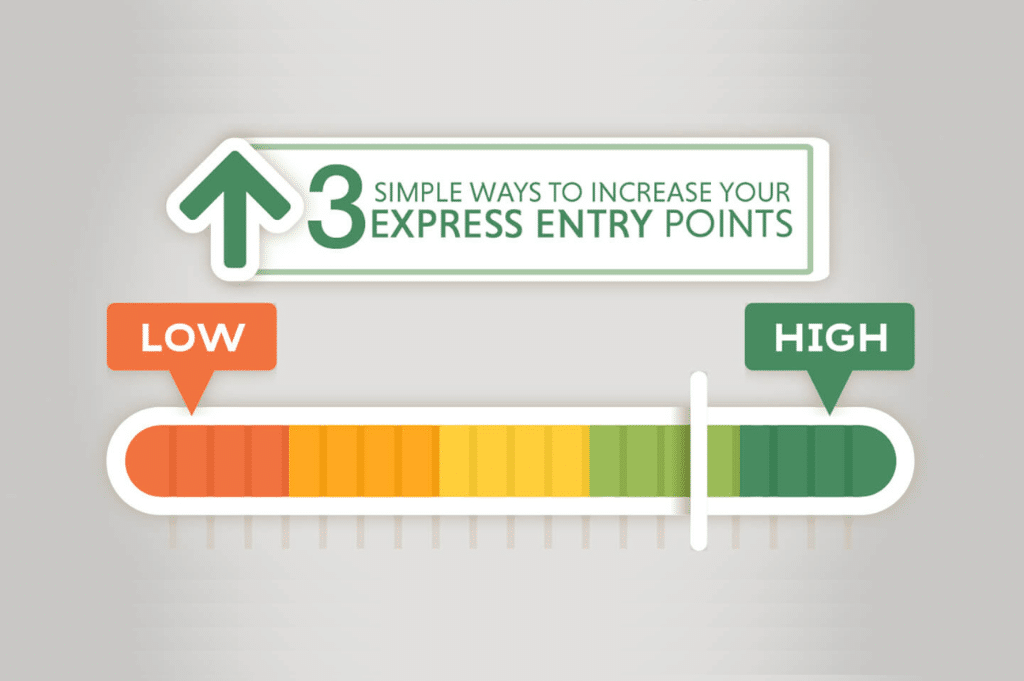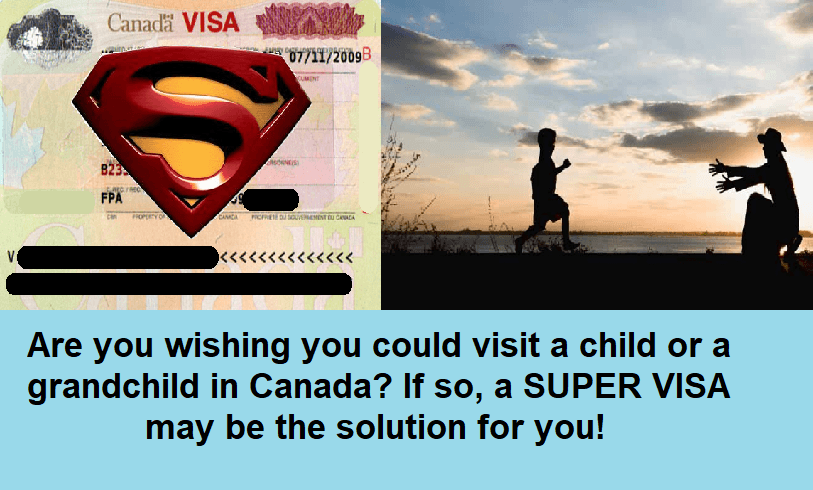Applying For A Canadian Super Visa
What Is A Super Visa?
Do you have a child or a grandchild in Canada? Would you like the opportunity to visit them more often? Do you wish to visit them for more than 6 months at a time? If this is the case, you may be interested in applying for a super visa, sometimes referred to as a parents or grandparents super visa. A super visa is a special type of temporary resident visa (TRV aka visitor’s visa), which allows individuals to enter Canada on multiple occasions for a period of up to 10 years. With a super visa, individuals are allowed to come to the country for up to two years at a time. It can be very difficult to visit family as frequently as one would like if they need to apply for a temporary resident visa each time they wish to visit their family in Canada. The Canadian government recognizes this, and has provided a solution for people in this situation. A super visa can alleviate some of the hardship which comes with visiting family in different countries. To learn more about how to apply for a super visa, and the privileges that come with travelling on a super visa, continue reading this article!
Who Can Apply For A Super Visa?
As mentioned, parents or grandparents of Canadian citizens or permanent residents of Canada can apply for a super visa. This is why it is commonly referred to as a parents or grandparents super visa. It is important to know that unlike a simple visitor’s visa (TRV), you cannot include dependent family members in the same application. You can only include your spouse or common-law partner as someone who is going to accompany your travels, on this application.
How Do I Apply For A Super Visa?
To apply for a super visa, you will need to provide proof that you are in fact, the parent or grandparent of a Canadian citizen or permanent resident. To do this, you could provide Canadian immigration services with a birth certificate or another official document which clearly states the applicant and the Canadian resident are related.
Along with this, you will need to complete a medical exam to ensure you are not inadmissible to Canada on health grounds. Regardless of the condition your health is in, you will need to prove that you have private medical insurance from a Canadian insurance company which is valid for at least one year from the time you arrive in Canada. Your health insurance must meet certain other requirements as well, such covering a minimum of $100’000 in health care costs.
Then, your child or grandchild, whoever is going to host you while you stay in Canada, must provide a letter of invitation which promises to support you for the entire duration you are in Canada. To do this, your child or grandchild will also have to provide documentation proving they are able to support you financially while you are in Canada. It is important to know that if your child or grandchild does not meet the low income cut-off (LICO), another individual may co-sign and promise financial support to meet the low income cut-off threshold. It is also very important to know that when one is providing information to prove they meet the LICO threshold, they must also include information about the number of people who live in the host’s household, as this directly affects the LICO threshold that is applicable to you. For example, if you live in a household with 3 people, the LICO threshold that applies to you, states that you must make at least $38’185 per year. Or, for example, if your child or grandchild lives alone, the LICO threshold which applies states they must make at least $24’949 per year.
In addition to these things, you must prove to an immigration officer that you meet all the requirements any individual seeking entry into Canada on a temporary basis, must meet. You must show an immigration officer that you have strong ties to your country of origin, and prove that you will be willing to return home at the end of your visit. You must also explain to an immigration officer why you seek entry into the country, and the purposes of your visit.
What Are The Benefits of a Super Visa?
The main benefits of a super visa are that it allows for multiple entries to the country for a period of up to 10 years. This may make it sound the same as a multiple entry visa, which also allows one to enter the country multiple times over a period of up to 10 years. Though, the other key difference is that with a multiple entry visa, individuals are only allowed to stay for up to 6 months at a time, before they must leave the country. Whereas with a super visa, individuals are allowed to stay for up to 2 years at a time from the time they arrive in Canada, before they must leave the country.
Does a Super Visa Always Allow Multiple Entries?
It is important to note that a Canadian immigration officer can administer a single-entry super visa to parents and grandparents who have applied for a super visa. Generally, a super visa allows for multiple entries, but this is not always the case. It will be clear on the super visa you are issued whether it allows for multiple entries, or only a single one. If you are granted a single-entry super visa, you are still permitted to stay for up to two years from the day you arrive in Canada on the visa.
What You Need to Know When Travelling With a Super Visa
When you arrive in Canada with a super visa, don’t be fooled into thinking the name “super visa” means you don’t have to worry about the other requirements you would need to meet if you were travelling to Canada on a regular temporary resident visa. While this visa may be more powerful than most, you must still ensure you have all the necessary documents when you arrive at the Canadian border. If you are from a visa-exempt country, you will need to have an approve electronic travel authorization (eTA), as well as a valid travel document, such as a passport. If you are from a non-visa exempt country, you will need your valid visa, as well as a valid travel document. It is important to understand if you require any additional documentation when you arrive at the Canadian border based on your country of origin, to avoid any delays in entering the country.
It is also very important to understand that even if you are from a visa-exempt country, if you want to visit the country for a period of longer than 6 months at a time, you must obtain a super visa to do so. Citizens from any part of the world who are not permanent residents or Canadian citizens cannot stay in Canada for longer than 6 months at a time.
Contact Akrami and Associates
If you have any further questions or feel unclear about whether a super visa is the right way for you to travel to Canada and visit your loved ones, it is important to have all your questions answered, before you begin the application process. Remember, it is essential that you a child or grandchild in Canada that is a citizen or permanent resident to be eligible to apply a Super Visa. If you do not, your application will not be successful. Visa applications are some of the most difficult applications to fill and complete accurately, so, it is highly recommended that you seek out professional and experienced help before attempting to submit the application. Here, at Akrami & Associates, we work and have experience with many different immigration issues. We have helped many of our clients apply for a super visa successfully, and be able to visit their family in Canada. If you believe that you might be eligible, please feel free to contact Akrami & Associates at our office at 416-477-2545 for more information or if you would like to book a consultation with an immigration professional for more advise.
With Akrami & Associates, there is always a way!
Latest Immigrations News

July 10, 2024
How to get an Intra-Company Transfer Work Permit
How to get an Intra-Company Transfer Work Permit Are you wondering how to get an Intra Company Transfer work permit? The Intra-Company Transfer (ICT) Work Permit offers a streamlined pathway for companies to transfer key personnel to their Canadian branches. This permit allows skilled workers to leverage their [...]

July 5, 2024
How to improve your CRS score for Express Entry
How to improve your CRS score for Express Entry Do you want to know how to improve your CRS score for Express Entry? Enhancing your CRS score involves a strategic approach, combining several factors to maximize your potential. Start by focusing on your educational credentials, ensuring all your [...]

July 4, 2024
Denied Entry to Canada for a DUI
Denied Entry to Canada for a DUI? Canada has strict immigration and border security policies, which include rigorous checks on individuals with criminal records. One common reason for being denied entry into Canada is a past conviction for driving under the influence (DUI). Have you been denied entry [...]

Book a Conslutation
One of our Representatives will
assist you with your matter. Book Now!
Click here

Call us for
more Information
+1-416-477-2545
Toll Free: 1-877-820-7121
Click here

Write Us (Online Form)
Complete our form and one of our
Representatives will contact you.
Click here
Subscribe To Our Newsletter


